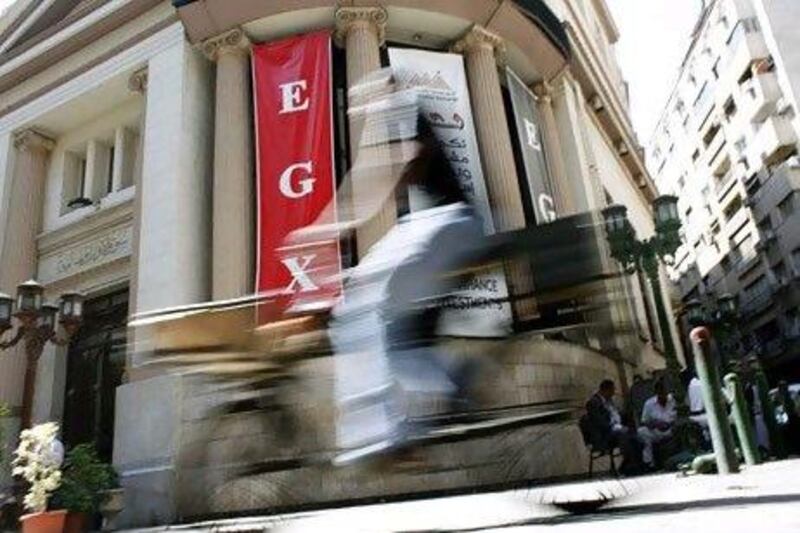A year after events in Egypt came to encapsulate the optimism of the Arab Spring one might be forgiven for thinking things there are already improving.
Egypt has been the best performing major market globally so far this year, with the EGX30 index rising 44.3 per cent in the year to date. Parliamentary elections have taken place and a new assembly held its first session earlier this month, with presidential elections due in the summer.
So far so good. But behind the scenes real progress has been much more elusive, with economic growth struggling and foreign exchange reserves plummeting.
Although encouraging in itself, the rally in local stocks comes off a very low base in the context of their performance over the past five years. Political and social tensions also remain elevated, as demonstrated by the football stadium riot this month.
Egypt's new political forces will have to move fast if they are to restore confidence, stave off a devaluation of the Egyptian pound, and make Egypt a genuine turnaround story that can inspire the region.
Egypt matters as much for what it represents about the Middle East and North Africa (Mena) region as a whole as it does in its own right. The largest population in the Mena area, one of the biggest economies, and for so long a leading player in the Middle East peace process, Egypt's influence spreads way beyond its borders.
Its tourism destinations also epitomise what most people's experience of the Middle East amounts to. Hence it matters to more than just Egyptians that the revolution there succeeds, as whatever the outcome, like it or not, it will reflect on the broader Arab world.
In this context the economic challenges are just as important as the political ones, if not more so, with their fortunes almost inevitably bound together. If anything was learned from the revolutions of last year, it was that popular aspirations and living standards can no longer be overlooked by regional leaders and governments.
Thus prioritising political change ahead of economic reforms runs the risk of succeeding with neither, if the population fails to see the benefits of the change that appears to be happening.
In Egypt's case, unless its economic challenges are tackled quickly and effectively the danger is that political reforms will never be wholly satisfying.
Even though presidential elections are not due until the summer the interim military government cannot afford to wait before addressing some of the key issues.
After growth contracted last year, the prospects for this year are only for limited growth of about 2 per cent, well below the 4 to 5 per cent trend rate that existed prior to the revolution, which was already insufficient to significantly narrow the income gap.
Furthermore, other key economic variables are deteriorating fast, which will also have a significant bearing on growth and employment. The loss of tourism revenues and foreign direct investment, along with rising capital outflows is damaging the external balance and putting pressure on an already weak fiscal position.
The budget deficit is likely to exceed 11 per cent of GDP this year as populist spending measures introduced last year are unlikely to be reversed anytime soon.
Foreign exchange reserves have dwindled and at US$16.4 billion (Dh60.24bn) at the end of last month they are now only capable of covering just over two months of imports - well below the usual danger point of six months cover.
In reality even the current amount is probably not capable of being used fully as most of it is required to meet external debt obligations.
Unsurprisingly the Egyptian pound is also under considerable strain but fear of the inflationary consequences of letting it devalue (inflation was 8.6 per cent last month) is keeping interest rates elevated, further hampering growth.
With its external debt obligations mounting, something will have to give.
Fortunately the Egyptian government appears to have had second thoughts about a proposed $3.2bn IMF standby loan, having resisted taking one last year.
It now looks as if the government will sign a deal with the IMF next month, but even this on its own is unlikely to be enough, given the rising deficit and the absence of private inflows.
External assistance worth $1.47bn has already been pledged by the GCC, and the World Bank is also purportedly negotiating another $1bn loan.
The hope must be that the IMF deal will act as a spur to other global lenders, at a time when access to capital is getting harder by the day.
This would buy time for Egypt to enact much needed structural reforms, in the realms of fiscal policy and on the supply side, helping to generate more sustainable long-term growth.
Without it, however, Egypt's economic prospects will deteriorate further, potentially also putting its hard-fought political progress at risk.
Tim Fox is Group Head of Research & Chief Economist at Emirates NBD. He writes here in a personal capacity





